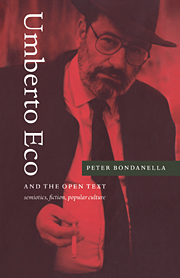Book contents
- Frontmatter
- Contents
- Preface
- ONE Umberto Eco's intellectual origins: medieval aesthetics, publishing, and mass media
- TWO The Open Work, Misreadings, and modernist aesthetics
- THREE Cultural theory and popular culture: from structuralism to semiotics
- FOUR From semiotics to narrative theory in a decade of radical social change
- FIVE “To make truth laugh”: postmodern theory and practice in The Name of the Rose
- SIX Interpretation, overinterpretation, paranoid interpretation, and Foucault's Pendulum
- SEVEN Inferential strolls and narrative shipwrecks: Six Walks and The Island of the Day Before
- EIGHT Conclusion
- Bibliography
- Index
TWO - The Open Work, Misreadings, and modernist aesthetics
Published online by Cambridge University Press: 23 October 2009
- Frontmatter
- Contents
- Preface
- ONE Umberto Eco's intellectual origins: medieval aesthetics, publishing, and mass media
- TWO The Open Work, Misreadings, and modernist aesthetics
- THREE Cultural theory and popular culture: from structuralism to semiotics
- FOUR From semiotics to narrative theory in a decade of radical social change
- FIVE “To make truth laugh”: postmodern theory and practice in The Name of the Rose
- SIX Interpretation, overinterpretation, paranoid interpretation, and Foucault's Pendulum
- SEVEN Inferential strolls and narrative shipwrecks: Six Walks and The Island of the Day Before
- EIGHT Conclusion
- Bibliography
- Index
Summary
Umberto Eco's treatises on medieval and Scholastic aesthetics reflect the esoteric and rarefied atmosphere of an Italian university, an erudition he satirizes in his parody of the history of philosophy. With his subsequent publications in the early 1960s – The Open Work and Misreadings – Eco continues his pattern of alternating a learned and erudite work with a parody and pastiche of the same subject-matter, but his cultural and critical theory now encompasses theoretical positions associated with the Italian avant-garde. During the same period, after working with the Turin television studio of the RAI from 1954 until 1958, Eco abandoned this post for an even more eventful career collaborating with Bompiani, a major Italian publishing house centered in Milan. From 1959 until the present day, Eco has played a major role at Bompiani, not only as the house's most profitable novelist but also as a major influence upon its editorial policy. While Eco's role at Bompiani was originally to direct a philosophical collection, Idee nuove (New Ideas), he was brought into the press for his familiarity with innovative theories from a wide variety of fields, and he continues to this day as an editor of several collections dealing with the fields of sociology and semiotics. By Valentino Bompiani's own testimony, it was Eco's parody of the history of philosophy in verse that first brought the young intellectual to the publisher's attention, not his more learned tomes on Scholastic aesthetics.
- Type
- Chapter
- Information
- Umberto Eco and the Open TextSemiotics, Fiction, Popular Culture, pp. 19 - 40Publisher: Cambridge University PressPrint publication year: 1997



